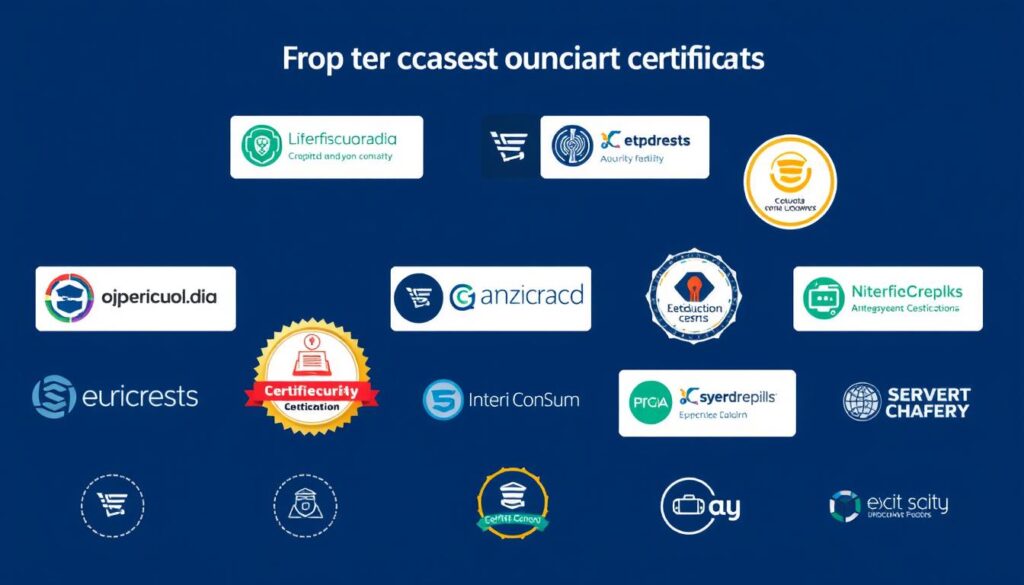The demand for cybersecurity professionals is skyrocketing. According to the US Bureau of Labor Statistics (BLS), the number of cybersecurity jobs is expected to surge by 32 percent between 2022 and 2032. This rapid growth indicates a significant shortage of skilled professionals in the cybersecurity industry.
As technology advances, the need for robust security measures becomes increasingly important. You might be wondering how to break into this field and what it takes to become a part of it. The cybersecurity field offers various entry points, whether you’re coming from an IT background or starting fresh.
Understanding the essential skills, qualifications, and certifications required can help you land your first cybersecurity role. This guide will walk you through the steps to start your journey into the exciting world of cybersecurity.
Key Takeaways
- Discover what entry-level cybersecurity entails and its growing demand.
- Explore the various entry points into the cybersecurity field.
- Learn about the essential skills and certifications required.
- Understand the typical career progression paths and salary expectations.
- Get actionable steps to start your cybersecurity journey.
Understanding Entry-Level Cybersecurity
The cybersecurity industry is booming, and entry-level positions are becoming increasingly available. As the digital landscape continues to evolve, organizations are facing an unprecedented number of cyber threats, making the role of cybersecurity professionals more critical than ever.
The Growing Demand for Cybersecurity Professionals
The US Bureau of Labor Statistics predicts a 32 percent growth in cybersecurity jobs between 2022 and 2032, much faster than the average for all occupations. This surge in demand is driven by the increasing need for organizations to protect themselves against cyber threats.
Cybersecurity is a field that offers numerous benefits, including competitive salaries and benefits, even at the entry-level. You’ll have the opportunity to work in a diverse and challenging environment that requires continuous learning and intellectual engagement.
What Makes Cybersecurity an Attractive Career Path
Cybersecurity offers a range of attractive features that make it an appealing career choice. Some of the key benefits include:
- Diverse and challenging work that keeps professionals engaged and continuously learning
- Competitive salaries and benefits, even at entry-level positions
- Flexibility in work arrangements, including remote opportunities
- Long-term career stability due to the ongoing need for cybersecurity skills
- Personal satisfaction from protecting organizations and individuals from cyber threats
By choosing a career in cybersecurity, you’ll be entering a dynamic and rewarding field with numerous opportunities for growth and development.
Common Entry-Level Cybersecurity Roles
If you’re new to cybersecurity, understanding the common entry-level roles can help you choose the right career path. As you begin your journey, you’ll find that many organizations offer various positions that are crucial for protecting their digital assets.
These roles not only provide a foothold in the industry but also offer valuable experience and skills that can be built upon. Let’s explore some of the most common entry-level cybersecurity positions.
Cybersecurity Analyst
A cybersecurity analyst is responsible for monitoring and analyzing security threats to an organization’s computer systems. You’ll work closely with senior team members to implement security measures and protect against potential breaches. This role requires a strong understanding of information security principles and practices.
Security Operations Center (SOC) Analyst
As a SOC analyst, you’ll be part of a team that monitors and responds to security incidents in real-time. Your primary focus will be on detecting and mitigating potential security threats, making it a critical role in maintaining an organization’s security posture. You’ll gain hands-on experience in using various security tools and technologies.
Junior Information Security Analyst
Many cybersecurity professionals enter the field as a junior information security analyst after gaining some experience in IT. In this role, you’ll assist senior team members with security assessments and audits, implement and maintain security controls, and participate in security awareness training for employees. You’ll also be involved in basic incident response and compliance monitoring, providing a comprehensive understanding of an organization’s security framework.
These entry-level roles offer a solid foundation for your cybersecurity career, providing the necessary experience and skills to progress to more senior positions. By understanding the responsibilities and requirements of each role, you can make an informed decision about which path to pursue.
Essential Skills for Entry-Level Cybersecurity Positions
To succeed in entry-level cybersecurity positions, you’ll need to possess a combination of technical and soft skills that enable you to effectively protect computer systems, networks, and sensitive information from cyber threats.
Technical Skills
Having a strong foundation in technical skills is vital for a career in cybersecurity. You’ll need to understand the basics of computer systems, networks, and cybersecurity principles.
Networking Fundamentals
Networking is a fundamental skill in cybersecurity, and certifications like CompTIA Network+ demonstrate your mastery of network management fundamentals.
Operating Systems Knowledge
You should be familiar with various operating systems, including Windows, Linux, and macOS, to understand their security features and vulnerabilities.
Basic Programming Skills
Having basic programming skills in languages like Python, C++, or Java will help you understand the technical aspects of cybersecurity and develop scripts to automate security tasks.
Soft Skills
In addition to technical skills, soft skills play a crucial role in cybersecurity. You’ll need to be able to communicate complex security issues to non-technical stakeholders and work collaboratively with other teams.
Problem-Solving Abilities
Cybersecurity professionals must be able to analyze complex security incidents and develop effective solutions to mitigate threats.
Communication Skills
You’ll need to communicate security information to various stakeholders, including technical teams, management, and customers, making communication skills essential.
Attention to Detail
Meticulous attention to detail is critical when analyzing logs and security alerts for potential threats. Overlooking small details can lead to significant security vulnerabilities in systems and networks.
- Thoroughness in security assessments and audits helps prevent breaches before they occur.
- Careful documentation practices support effective cybersecurity incident investigations and responses.
- Employers value professionals who can maintain focus and precision during lengthy work tasks.
Education and Qualifications
The journey to becoming a cybersecurity professional begins with acquiring the right education and qualifications. As the field continues to evolve, it’s crucial to stay informed about the best educational pathways and certifications that can launch your career.
Degree Options
You can pursue a degree in cybersecurity or related fields like computer science or information assurance. Many universities now offer specialized cybersecurity programs that cover risk management, threat analysis, and security protocols.
When selecting a degree program, consider factors like curriculum, faculty expertise, and industry connections. Some of the best cybersecurity degree programs are those that offer hands-on experience and are accredited by recognized accrediting agencies.

Bootcamps and Online Courses
If you’re looking for alternative or supplementary education, cybersecurity bootcamps and online courses can be a great option. These programs are often intensive and focus on practical skills that are immediately applicable in the workplace.
Cybersecurity bootcamps can range from a few weeks to several months and cover topics like penetration testing, incident response, and security fundamentals. Online courses offer flexibility and can be a good way to gain specific skills or knowledge in areas like CompTIA Security+.

Essential Certifications for Beginners
Earning certifications is a significant step in demonstrating your expertise and commitment to potential employers. For entry-level positions, certifications like CompTIA Security+, CompTIA Network+, and CompTIA CySA+ are highly valued.
- CompTIA Security+: Validates your fundamental cybersecurity knowledge and skills.
- CompTIA Network+: Demonstrates your understanding of networking concepts crucial for security roles.
- Certified Information Systems Security Professional (CISSP): Although more advanced, its associate version is available for those with less experience.
- Vendor-specific certifications from Microsoft, Cisco, and AWS can enhance your employability in certain environments.
These certifications not only serve as proof of your knowledge but also provide valuable learning experiences. By preparing for these certifications, you’ll gain practical skills that are directly applicable to your future role.
Entry Level Cyber Security: What Is It? and How to Become One?

Breaking into the cybersecurity field requires a strategic approach, starting with a solid foundation in IT. To become a cybersecurity professional, you need to understand the steps involved in gaining the necessary skills and experience.
Here’s a step-by-step guide to help you get started:
Step 1: Build Your Foundation in IT
Begin by building a strong foundation in IT. This includes understanding computer systems, networks, and operating systems. You can start with basic IT courses or certifications that cover these topics. Having a solid IT background will make it easier to transition into cybersecurity.
Step 2: Gain Relevant Education and Training
While a degree is not necessarily required, having some form of structured training can accelerate your path toward a job in cybersecurity. Consider enrolling in cybersecurity courses or boot camps that provide hands-on training and cover essential topics like threat analysis, risk management, and security protocols.
Step 3: Earn Entry-Level Certifications
Earning entry-level certifications can significantly boost your credibility and demonstrate your commitment to the field. Certifications like CompTIA Security+ or Certified Information Systems Security Professional (CISSP) can be beneficial. These certifications show that you have a certain level of knowledge and skills required for cybersecurity roles.
Step 4: Develop Practical Experience
Gaining experience is crucial for a successful career in cybersecurity. You can gain hands-on experience through:
- Home labs and virtual environments to practice what you’ve learned.
- Platforms like HackTheBox and TryHackMe that offer practical training.
- Contributing to open-source security projects to build your portfolio.
- Participating in cybersecurity competitions, capture-the-flag events, and bug bounty programs.
- Volunteering for non-profits to gain real-world experience while helping organizations in need.
- Internships and apprenticeships to bridge the gap between learning and professional work in cybersecurity.
By following these steps, you can set yourself up for success in the field of cybersecurity. Remember, continuous learning and gaining practical experience are key to advancing your career.
Career Progression Paths in Cybersecurity
As you progress in your cybersecurity career, you’ll have various paths to choose from, each offering unique challenges and opportunities. The field of cybersecurity is vast and diverse, allowing you to specialize in areas that align with your interests and skills.
Security Engineering and Architecture
You can pursue a career in security engineering and architecture, where you’ll design and implement secure systems and infrastructure. This role involves understanding the organization’s security requirements and developing solutions to protect against potential threats. Key responsibilities include:
- Designing secure systems and networks
- Implementing security protocols and measures
- Ensuring compliance with security standards and regulations
Incident Response and Digital Forensics
Another career path is in incident response and digital forensics, where you’ll respond to security incidents and investigate cybercrimes. This involves analyzing evidence, identifying the root cause of incidents, and developing strategies to prevent future occurrences. You’ll work closely with law enforcement agencies and other stakeholders to resolve security incidents.
Security Management and Administration
You can also move into security management and administration, overseeing an organization’s overall cybersecurity posture. This includes developing security policies, managing security teams, and ensuring compliance with regulatory requirements. Effective security management is crucial for protecting an organization’s assets.
Penetration Testing and Ethical Hacking
As a penetration tester or ethical hacker, you’ll simulate real-world attacks to identify vulnerabilities in systems and networks. This role involves using various techniques, including social engineering and network exploitation, to test an organization’s defenses. You’ll provide recommendations to improve security and prevent potential breaches. Some key activities include:
- Conducting penetration tests and vulnerability assessments
- Identifying and exploiting system weaknesses
- Providing recommendations for security improvements
These career paths in cybersecurity offer a range of opportunities for growth and specialization. By understanding the different roles and responsibilities, you can make informed decisions about your career progression and choose a path that aligns with your goals and interests.
Salary Expectations for Entry-Level Cybersecurity Roles

Entry-level cybersecurity jobs not only offer a chance to start a rewarding career but also come with competitive salaries. As you begin your journey in this field, understanding the factors that influence your salary is essential.
Factors Influencing Cybersecurity Salaries
Several factors can affect your salary in cybersecurity, including your level of experience, the specific job role you take on, and the industry you work in. For instance, working in finance or government sectors might offer different salary scales compared to other industries.
Salary Growth Potential
As you gain experience and move into more advanced roles, your salary is likely to increase. Specializing in high-demand areas such as cloud security or security architecture can also accelerate your career growth and salary potential. For more information on entry-level cybersecurity jobs, you can visit this resource.
Continuous skill development and maintaining relevant certifications are key to long-term career success and salary growth in the cybersecurity industry.
Overcoming Challenges as a Cybersecurity Beginner
Navigating the complexities of cybersecurity requires a combination of knowledge, skills, and strategic learning. As a beginner, you’re not only learning about the latest threats and defense mechanisms but also how to apply this knowledge effectively in real-world scenarios.
Building a Professional Network
Building a professional network is crucial in the cybersecurity field. It allows you to learn from experienced professionals, gain insights into new trends and technologies, and potentially uncover job opportunities. You can start by attending industry conferences, joining online forums and groups related to cybersecurity, and connecting with professionals on platforms like LinkedIn.
- Attend cybersecurity conferences and seminars to learn from industry experts and network with peers.
- Participate in online forums and discussion groups to stay updated on the latest cybersecurity issues.
- Leverage social media platforms to connect with cybersecurity professionals and stay informed about industry events.
Continuous Learning Strategies
To stay current in the ever-evolving cybersecurity landscape, adopting continuous learning strategies is essential. This involves not just formal education but also self-directed learning and practical experience. You can enhance your skills by subscribing to security blogs, podcasts, and newsletters, creating personal lab environments to practice new techniques, and participating in capture-the-flag competitions.
- Subscribe to reputable security blogs, podcasts, and newsletters to stay updated on the latest threats and defense strategies.
- Create a personal lab environment to safely practice new security techniques and tools.
- Participate in capture-the-flag competitions and security challenges to sharpen your practical skills.
Conclusion
The importance of cybersecurity in today’s digital landscape cannot be overstated, making it a promising career path.
To launch your cybersecurity career, focus on acquiring foundational skills and knowledge. You’ll find diverse information security career paths available as you gain experience in the information security field.
A balance of technical and soft skills is crucial for long-term success in cybersecurity jobs. While the learning curve is steep, the rewards, including job satisfaction and competitive compensation, make it worthwhile. Take the first step toward your entry-level cybersecurity career today.
